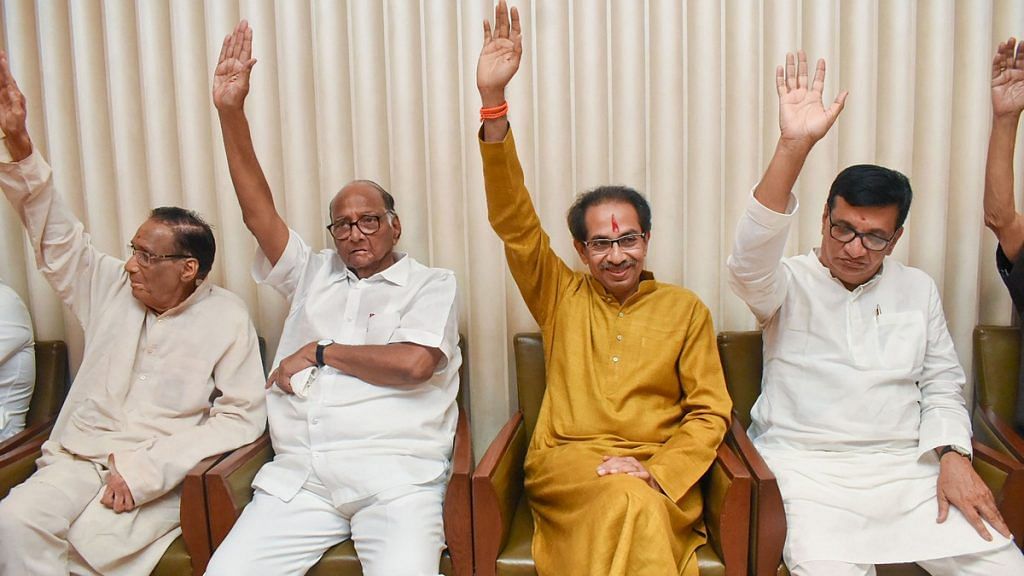I’m sure many people may have heard of the saying “Too many cooks spoil the broth”. This proverb suggests that if too many people are involved in a task, they will end up ruining it. A clash is bound to arise because everyone will prefer to take their own approach. Now place this exact same context in Maharashtra’s current politics, which looks nothing less than an unlikely alliance stitched together to form the ‘Maha Vikas Aghadi’ government.
While I do not necessarily say that the Shiv Sena-Congress-Nationalist Congress Party alliance is bound to fail in the responsibilities that have been handed over to it by the BJP government, it is quite likely that the distinct ideologies of the three alliance partners will lead to some sort of clash among them in their five-year term.
Also read: Uddhav Thackeray, once a critic of dynastic politics, now has 22 dynasts in his cabinet
Why NCP, Shiv Sena joined hands
The Shiv Sena is popular for having pursued Hindutva politics since its inception in 1966, but the NCP has historically stood for liberalism and secularism. As one can clearly point out, these two ideologies are starkly different. The two political parties came together only so that the BJP could be prevented from coming back to power or because the Shiv Sena was adamant to have a chief minister from its own party, a demand that the former had categorically turned down.
It can very easily be assumed that the contrasting beliefs of these parties may lead to their downfall sooner or later, but is it wise to assume that the Shiv Sena in a way sacrificed its ideologies just to acquire the CM’s post? Since being sworn-in as the chief minister of Maharashtra on 28 November, 2019, Shiv Sena leader Uddhav Thackeray has not displayed any signs of being a Hindutva supporter, which was the case earlier when he frequently wore orange apparels. While Hindutva was once Shiv Sena’s foundation and core strategy to appeal to its Hindu vote bank, the party has now seemingly adopted a more diluted version of that radical ideology. One prime example of this is the Supreme Court’s Ayodhya verdict in November 2019. The Shiv Sena pushed for the construction of a Ram Mandir in Ayodhya all these years, but when the judgement was announced, Uddhav Thackrey chose to make a cryptic comment. He had said that Hindus should celebrate but not in a way that hurts “anybody’s sentiments”.
Also read: Importance of Ajit Pawar — why all is forgiven and the NCP leader is deputy CM again
New age politics
The question that comes to my mind is even though the Shiv Sena seems to have watered down its Hindutva politics, are there any tangible changes actually being made? We can’t be sure as yet on whether Maharashtra is witnessing a new era of Shiv Sena politics, or whether the party is putting on a temporary façade just to stay in power and retain the CM’s chair.
The unlikely alliance in Maharashtra can only stand the test of time if all the three political parties involved make individual sacrifices. It cannot be completely expected of the Shiv Sena to abandon policies that it has so far stood for because that could hurt its vote share in the next assembly election. The NCP and the Congress, on the other hand, cannot and should not force the complete enforcement of their party ideologies.
If the alliance partners in the government are able to reach a compromise in terms of finding an ideological middle ground, it is quite likely that this could usher in a new age of politics in Maharashtra, where public welfare is the only objective of the parties in power.
Aadhya Venkatesh is the winner of the opinion writing contest on the sixth edition of Democracy Wall, Season 2. This was in response to the question asked by ThePrint: Can the unlikely NCP-Cong-Shiv Sena alliance in Maharashtra survive a full 5-year term?
Democracy Wall is a monthly free speech campus initiative organised by ThePrint in collaboration with Facebook.
